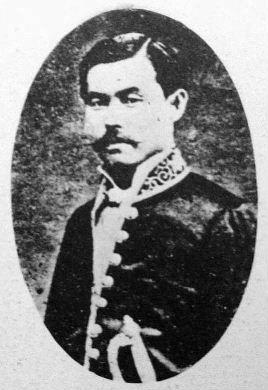Rikken Teiseitō on:
[Wikipedia]
[Google]
[Amazon]
 The was a short-lived
The was a short-lived
 The was a short-lived
The was a short-lived conservative
Conservatism is a cultural, social, and political philosophy that seeks to promote and to preserve traditional institutions, practices, and values. The central tenets of conservatism may vary in relation to the culture and civilization i ...
political party
A political party is an organization that coordinates candidates to compete in a particular country's elections. It is common for the members of a party to hold similar ideas about politics, and parties may promote specific political ideology ...
in the Meiji period
The is an era of Japanese history that extended from October 23, 1868 to July 30, 1912.
The Meiji era was the first half of the Empire of Japan, when the Japanese people moved from being an isolated feudal society at risk of colonization ...
Empire of Japan
The also known as the Japanese Empire or Imperial Japan, was a historical nation-state and great power that existed from the Meiji Restoration in 1868 until the enactment of the post-World War II 1947 constitution and subsequent fo ...
. It was also known as simply the Teiseitō.
History
The Teiseitō was founded in March 1882, by the editor of the ''Tokyo Nichi Nichi Shimbun
Tokyo (; ja, 東京, , ), officially the Tokyo Metropolis ( ja, 東京都, label=none, ), is the capital and largest city of Japan. Formerly known as Edo, its metropolitan area () is the most populous in the world, with an estimated 37.4 ...
,'' Fukuchi Gen'ichirō
was a Japanese critic and author, also known under the pseudonym .
Biography
Fukuchi Gen'ichirō was born in Nagasaki, Japan. He traveled Europe as a translator, and in 1874, became a main writer for the ''Tokyo Nichi Nichi Shimbun
To ...
, and a number of bureaucrats and conservative journalists as a political support group for the conservative Meiji oligarchy
The Meiji oligarchy was the new ruling class of Meiji period Japan. In Japanese, the Meiji oligarchy is called the .
The members of this class were adherents of ''kokugaku'' and believed they were the creators of a new order as grand as that est ...
. The new party was supported by Itō Hirobumi
was a Japanese politician and statesman who served as the first Prime Minister of Japan. He was also a leading member of the ''genrō'', a group of senior statesmen that dictated Japanese policy during the Meiji era.
A London-educated samur ...
and Inoue Kaoru
Marquess Inoue Kaoru (井上 馨, January 16, 1836 – September 1, 1915) was a Japanese politician and a prominent member of the Meiji oligarchy during the Meiji period of the Empire of Japan. As one of the senior statesmen ('' Genrō'') in J ...
It advocated a constitutional monarchy
A constitutional monarchy, parliamentary monarchy, or democratic monarchy is a form of monarchy in which the monarch exercises their authority in accordance with a constitution and is not alone in decision making. Constitutional monarchies dif ...
with a constitution
A constitution is the aggregate of fundamental principles or established precedents that constitute the legal basis of a polity, organisation or other type of Legal entity, entity and commonly determine how that entity is to be governed.
When ...
, to be eventually granted by Emperor Meiji
, also called or , was the 122nd emperor of Japan according to the traditional order of succession. Reigning from 13 February 1867 to his death, he was the first monarch of the Empire of Japan and presided over the Meiji era. He was the figur ...
, an electoral franchise
Suffrage, political franchise, or simply franchise, is the right to vote in public, political elections and referendums (although the term is sometimes used for any right to vote). In some languages, and occasionally in English, the right to v ...
based on adult male property holders and restrictions on freedom of speech and assembly. It viewed the populist political parties, especially the ''Rikken Kaishintō
The was a political party in Empire of Japan. It was also known as simply the Kaishintō.
The Kaishintō was founded by Ōkuma Shigenobu on 16 April 1882, with the assistance of Yano Ryūsuke, Inukai Tsuyoshi and Ozaki Yukio. It received fin ...
'' and the '' Jiyūtō'' as its main rivals. It was disbanded in September 1883.
References
Defunct political parties in Japan Political parties established in 1882 Political parties disestablished in 1883 1882 establishments in Japan Politics of the Empire of Japan 1883 disestablishments in Japan {{Japan-gov-stub